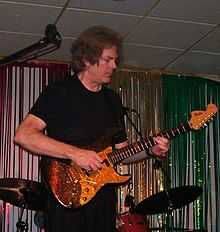John Jorgenson
| John Jorgenson | |
|---|---|
 John Jorgenson playing Gypsy Jazz in 2009 | |
| Background information | |
| Born |
July 6, 1956 Madison, Wisconsin, United States |
| Genres | Gypsy jazz, Country, Rock |
| Instruments | Guitar, mandolin, mandocello, Dobro, pedal steel, piano, upright bass, clarinet, bassoon, saxophone |
| Years active | 1970-Present |
| Labels | FGM |
| Associated acts | Desert Rose Band, The Hellecasters, Michael Nesmith, Elton John |
| Website | http://johnjorgenson.com |
| Notable instruments | |
| Fender Telecaster | |
John Jorgenson (born July 6, 1956 in Madison, Wisconsin[1]) is an American musician. Although best known for his guitar work with bands such as the Desert Rose Band and The Hellecasters, Jorgenson is also proficient in the mandolin, mandocello, Dobro, pedal steel, piano, upright bass, clarinet, bassoon and saxophone.[2] While a member of the Desert Rose Band, Jorgenson won the Academy of Country Music's "Guitarist of the Year" award three consecutive years.
Jorgenson has also recorded or toured with many artists including Elton John, The Byrds, Bob Dylan, Bob Seger, Willie Nelson, Johnny Cash, Emmylou Harris, Hank Williams Jr., Barbra Streisand, Luciano Pavarotti, Roy Orbison, Patty Loveless, Michael Nesmith and Bonnie Raitt.[3][4]
Early years
Jorgenson has played professionally since the age of fourteen, and had been playing both the piano and clarinet since age eight.[5]
He was born in 1956 in Madison, Wisconsin, into a musical family. His mother was a piano teacher and his father an orchestra conductor and college music professor.[6]
Jorgenson attended junior and senior high school in Redlands, California, graduating in May 1974.[7][8][8] One of his early bands in this period was named Rocking Pneumonia, circa 1971.
In his early 20s he played full-time at Disneyland, playing clarinet with the Main Street Maniacs (Dixieland), mandolin with the Thunder Mountain Boys (bluegrass) and guitar with the Rhythm Brothers (Django Reinhardt style swing). These three groups were composed of the same four members, who changed costumes and music styles at intervals throughout each day.
Later years
In 1993 Jorgenson formed the guitar trio The Hellecasters, along with Will Ray and Fairport Convention guitarist Jerry Donahue. Originally intended as a temporary collaboration, the Hellecasters went on to release several albums during the 1990s. Their debut, Return of the Hellecasters, released in 1993 won both the "Album of the Year" and "Country Album of the Year" awards from Guitar Player Magazine.
In 1994 Jorgenson was invited to join Elton John's band for an 18 month tour. Jorgenson remained with the band for the next six years performing both live and in the studio. His versatility was evident on stage, as he played guitar and saxophone for Elton in concert.
In 2004 Jorgenson portrayed the legendary Jazz guitarist Django Reinhardt for the film, Head in the Clouds. Jorgenson was found by the films music coordinator and consultant Scottpatrick Sellitto and Jorgensons performance was praised worldwide.
Jorgenson continues to perform and tour with his own gypsy jazz ensemble, John Jorgenson Quintet. The band's members are John Jorgenson (lead guitar), Doug Martin (rhythm guitar), Jason Anick (violin), Simon Planting (bass) and Rick Reed (percussion).
Jorgenson is also a patron for Guitar-X (Tech Music Schools) in London, which he regularly visits to hold master classes for the students.
The 2008 Brad Paisley album Play, an album that was mostly instrumental, Jorgenson was a part of the song "Cluster Pluck" and collaborated with Brad Paisley, James Burton, Vince Gill, Albert Lee, Brent Mason, Redd Volkaert and Steve Wariner for the song. The tune won a Grammy award in the Best Country Instrumental Performance category.[9]
The Fender Signature Hellecaster Guitars

Best known for using a variety of G&L and other electric guitars as a solo artist and as a member of the slinging guitar trio Hellecasters, John Jorgenson got his own Fender signature models in 1997.
Fender Limited Edition John Jorgenson Hellecaster
This limited-edition signature guitar was made in Japan in 1997. It features a black sparkle-finished maple body, vintage-tinted, high-gloss maple neck with reversed large-style Strat headstock, rosewood fretboard with gold sparkle dot inlays, 22 jumbo frets and Schaller locking tuners. Refinements included three Seymour Duncan custom-voiced, split-coil, hum-cancelling pickups which allow players to get controlled feedback in distortion mode and a custom-wired, five-way pickup selector switch with an additional push/pull control allowing seven tone variations. Other touches included a custom two-pivot-point tremolo, a Wilkinson "Wilkaloid" self-lubricating nut, gold sparkle pickguard and gold hardware.
Fender John Jorgenson Signature Custom Korina Telecaster
Made at the Fender Custom Shop in 1998, this guitar sported a solid Korina body, a maple neck with pearloid dot inlays and a 25.5" scale length, African rosewood or an ebony on black finish fretboard with 22 Dunlop 6130 frets. Other features included dual side-by-side Telecaster humbucking pickups, a modified vintage style Tele bridge, a special custom five-way pickup switching featuring five different combinations (each in humbucking mode), 1.688" width at the nut and Sperzel Trimlok locking tuners.
See also
- Hellecasters
- Desert Rose Band
- Gypsy jazz
References
- ↑ John Jorgenson, born in Madison, Wisconsin, singer, Desert Rose Band-Love Reunited July 6 in History
- ↑ The Austin Django Jazz Festival - celebrating the music of Django Reinhardt
- ↑ electro harmonix: John Jorgenson
- ↑ John Jorgenson
- ↑ John Jorgenson Online
- ↑ Gypsy Jazz Page
- ↑ Moore Annual Staff, "Jester", Moore Junior High School, Redlands, California, 1970, page 32.
- ↑ 8.0 8.1 Redlands High Annual Staff, "Makio", Redlands Senior High School, Redlands, California, 1972, page 123.
- ↑ "The 51st Annual Grammy Awards Nominations List". Grammy.com. 2008. Retrieved April 1, 2009.
External links
|